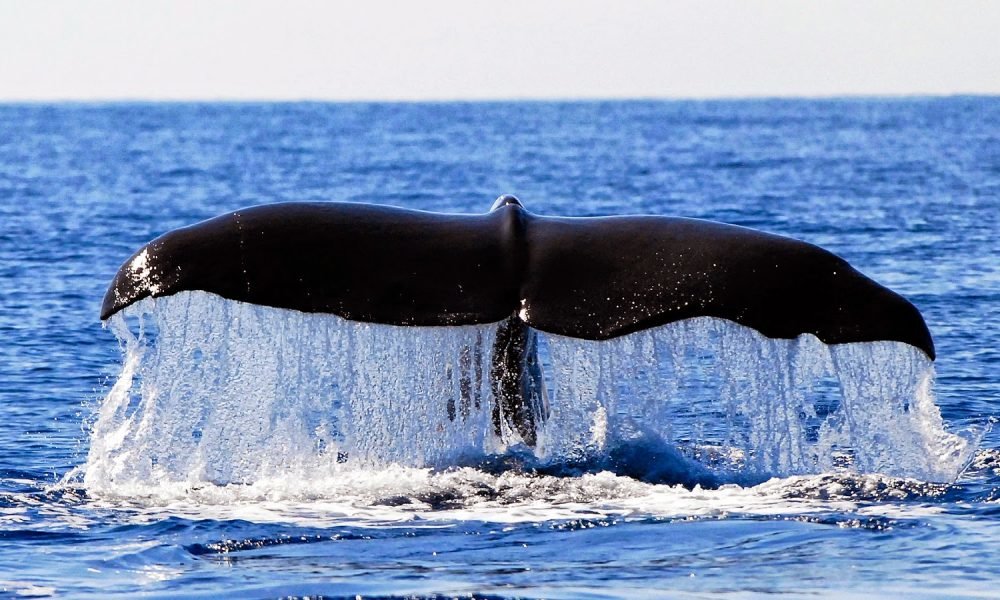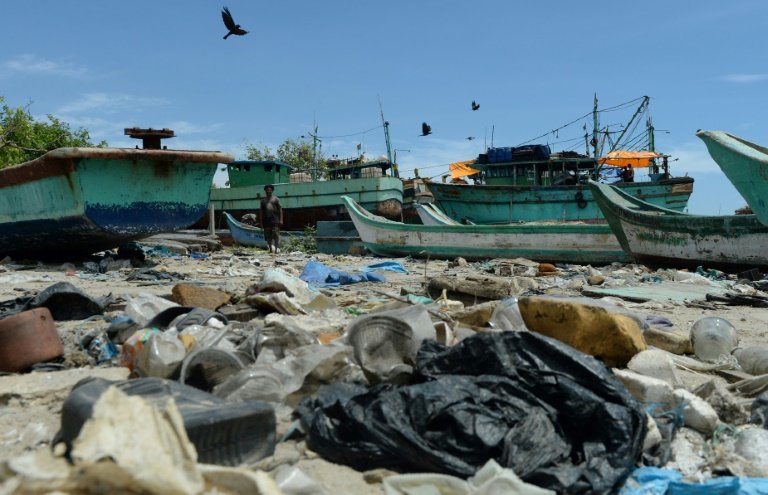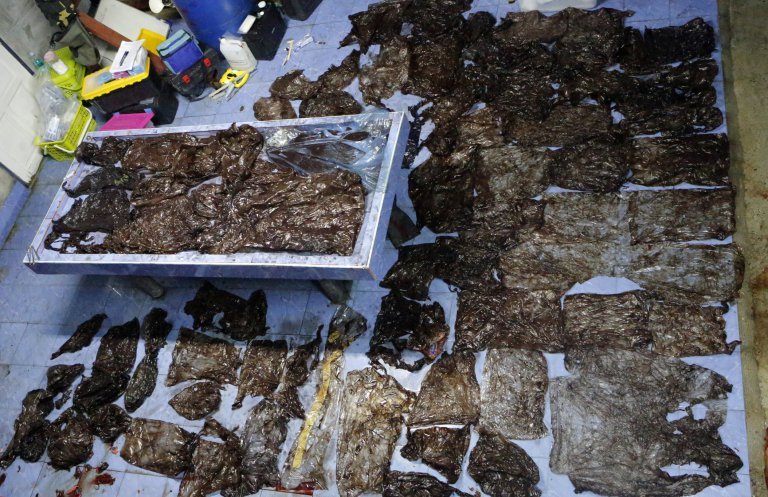
Whale Swallows 80 Plastic Bags and Dies of Starvation

Plastic waste in our oceans has become a major environmental concern due to its effects on our marine life and threatens the existence of many marine animals and seabirds; in the last few decades, plastic has become a vital part of our daily lives with applications ranging from packaging to transportation but it has also come to be known as potentially disastrous for our planet.
According to studies, there is almost four million tons of trash discarded every single day and 12.8, 12.8% of which is plastic; in fact, more than 12.7 million tons of plastic is washed away into our oceans every year.

More than 12.7 million tons of plastic winds up in the oceans every year contributing to the deadly plastic waste crisis that is killing marine life
A Whale’s struggle for Life
In Thailand’s southern province of Songkhla, a team of veterinarians found a pilot whale that was severely sick and unable to hunt for food. The rescuers tried and failed to cure the whale which eventually died after a few days under their care.
In a postmortem it was revealed that the whale had in fact swallowed more than 80 plastic bags with a total weight of 17 pounds. This means that the whale’s stomach was filled with plastic which deemed it unable to swallow or digest its food, starving the whale to death.
Pilot whales mainly hunt for marina animals including squid, octopus and small fish which explains why it might have assumed the floating plastic bags to be food and accidentally ingesting them. After ingesting numerous plastic bags, the whale’s digestives tract was eventually blocked which resulted in the whale starving to death.
The rescuers attempted to save the whale which vomited 5 plastic bags during the rescue but were ultimately unable to save its life primarily due to the sheer number of plastic waste in its stomach.
Thailand’s Plastic Problem
Thailand is believed to be one of the world’s worst countries when it comes to dumping of plastic waste into the ocean; the country pumps more than 1 million tons of plastic waste into the sea every year. Thailand itself is a major manufacturer of plastic which explains the widespread use of plastic across the country.

A pilot wale in Thailand’s southern province of Songkhla died due to starvation after swallowing 80 bags of plastic
According to studies, Thailand is the world’s sixth largest contributor of ocean waste and the problem is mainly attributed to the people’s inability and lack of education towards recycling of plastic.
The country however is taking steps to reduce the plastic problem it faces; around 400 recycling facilities have been established, collecting waste which is then sorted and recycled. Experts argue that these steps are in fact counterproductive because they further discourage the people of Thailand to personally take initiative towards recycling, leaving the problem for the government and facilities to handle.
The government of Thailand is also promoting its “no bags, no baht” campaign which enables the locals to save one baht for every one hundred baht spent if the customers bring their own cloth bags to the shopping market.
The Global Fight against Plastic
Many nations across the world have sprung into action to fight the plastic problem faced by our planet; China has cracked down on the distribution of plastic bags and banned the imports of plastic waste and has thus reported a 66% reduction in the use of plastic around the country. Other Asian countries like Malaysia, India and Indonesia have committed towards efforts to cut down on plastic usage by either banning or taxing the use of plastic bags in their respective countries.
Additionally, the European Union has also established concrete rules towards that will help to preserve marine life and reduce the marine litter in European countries.
The European commission has banned certain plastic products including single use plastic products like plastic cutlery, straws, stirrers, etc. The commission has also obliged the manufacturers of plastic materials to be involved in the cleanup and recycling of plastic along with the obligation on its countries to collect 90% of their single use plastics by the year 2025.
All of these initiatives undertaken by numerous countries around the world shall help to bring awareness to the plastic problem we face and hopefully these positive steps shall be the beginning of a worldwide pursuit of a cleaner and healthy planet.
More in Medical Conditions
-
Check Your Sodium Intake—Not All Salts You Eat Are the Same
Salt is one of the most basic and most important ingredients in cooking. There are a lot of variants of salt...
November 1, 2023 -
Worried About Diabetes? Here Are Some Common Myths
There are several myths about diabetes that are frequently reported as facts. Diabetes misrepresentations can sometimes be harmful, leading to an...
June 29, 2023 -
Many Patients Pay Their Medical Costs Out Of Their Pockets – Even With Insurance
With rising inflation, it has become difficult for people to even fulfill their basic necessities. They are more concerned about how...
June 6, 2023 -
What Is The Right Weight For Kids And How To Gain Weight Healthily
Keeping your child happy and healthy is the primary concern of every parent. Parents usually focus on providing their young ones...
May 12, 2023 -
Thyroid Disorders in Children: What Parents Need to Know
Thyroid disorders are not limited to adults; they can also affect children. The thyroid gland produces hormones that play a crucial...
April 29, 2023 -
Should Doctors Attend To Patients With ‘Do Not Resuscitate Tattoos’?
Doctors at the University of Miami hospital were confronted with a dilemma when a 70-year-old unconscious man with a tattoo “do...
April 3, 2023 -
Your Antidepressant May Not Work If You Keep Doing This One Thing
People use social comparison to measure their self-worth. Social comparison has been in existence since time immemorial, and it is as...
April 1, 2023 -
Pro Tips on Preventing Hair Breakage While Keeping Your Hair Moisturized at Home
Every one of us is thinking a lot about how to forestall hair breakage and keep them moisturized at home. Since...
March 22, 2023 -
Planning to Travel After Retirement? This is the Best Medicare Coverage for You
Does Medicare insurance go with you once you are out of the country? It’s currently open enrollment period, and while planning...
March 14, 2023















You must be logged in to post a comment Login